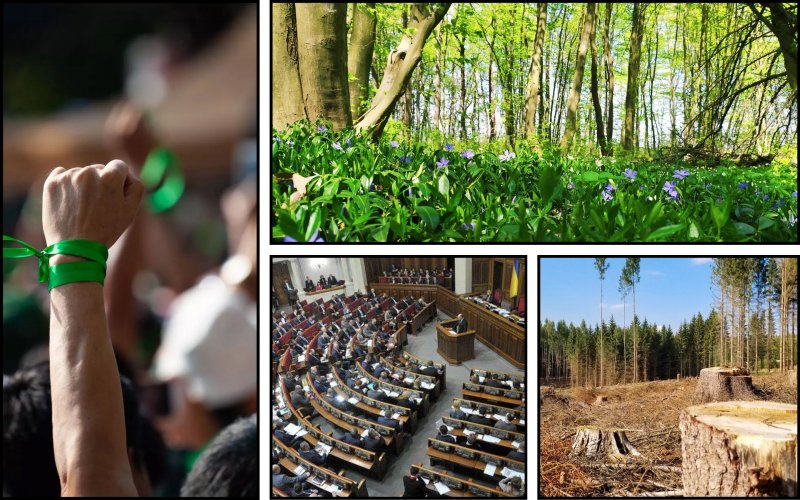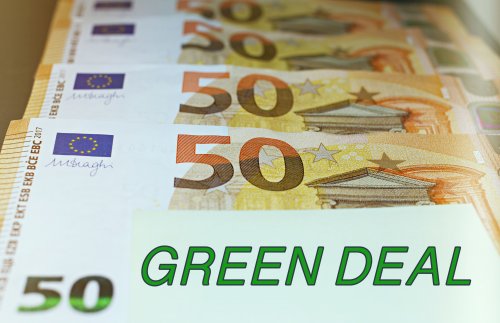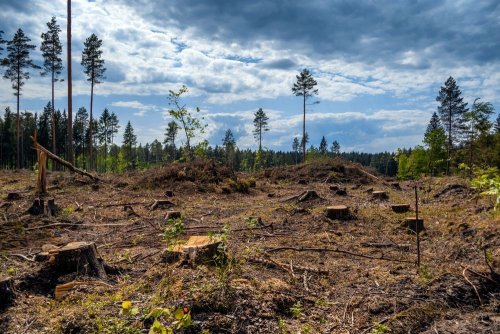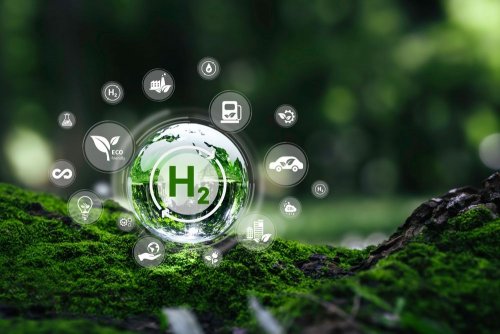For two years now, Ukraine has been reforming the environmental sector under the leadership of Minister Ruslan Strilts. Some reforms are nearing completion, some are mired in corruption, and some are still at the stage of ideas on paper.
EcoPolitic analyzed the results of the Ministry of Environmental Protection and Natural Resources for the first three months of 2024.
Billions of euros for Ukrainian reforms
At the end of February, the European Parliament supported a €50 billion financial assistance program for Ukraine for 2024-2027. It is called the Ukraine Facility. In order to receive this money, the Cabinet of Ministers of Ukraine has to demonstrate to its European partners that it is reforming the Ukrainian economy in line with the EU's model. Therefore, the Government developed a reform plan and submitted it to the European Commission in March.
In particular, six reforms are planned as part of Ukraine's green transition:
- climate neutrality course;
- launch of the market for carbon emissions quotas;
- combating industrial pollution;
- combating illegal deforestation;
- environmental impact assessment and strategic environmental assessment;
- waste management.
Every three months, reforms will be evaluated according to relevant indicators. If Ukraine successfully implements the tasks set out in the Ukraine Facility Plan, it could receive €16 billion this year.
On April 15, the European Commission approved the Ukrainian reform plan. Within a month, the EU member states will have to approve it. If this happens, Ukraine could receive almost €2 billion.
Out of €50 billion, €2.5 billion will be allocated to reform the environmental protection system. Olha Boyko, coordinator of the EBA's Industrial Ecology and Sustainable Development Committee, noted that Ukraine will not receive €2 billion for environmental reforms under the Ukraine Facility program.
"The Ukraine Facility clearly stipulates that it should replace some other support programs. Under the Multi-annual Indicative Program, which was approved for Ukraine as a signatory to the Association Agreement with the EU, 923 million euros were supposed to be allocated for green transformation. Under the Instrument for Pre-Accession Support (to the European Union – ed.), Ukraine would have been eligible for €3.5 billion. Thus, it lost 2 billion euros by voluntarily abandoning other larger and more sustainable funding programs in terms of environmental protection and climate change," the expert said.
In the environmental environment, they emphasize that although the Plan for Ukraine Facility provides for the implementation of European Union practices, it is only partial. Gaps and inefficiencies can hold back reforms.
Adaptation of Ukraine to climate change
In January, the Ministry of Environment presented the Strategy for the formation and implementation of state policy in the field of climate change for the period until 2035.
"Its provisions are aimed at ensuring an effective transition to low-carbon development, while guaranteeing the country's economic, energy and environmental security," the Ministry of Environment noted.
Already in February, a draft law "On the Basic Principles of State Climate Policy" was promulgated to implement the plans set out in the document.
Representatives of the environmental community point out that the above strategy is not fully developed. In particular, it does not clearly spell out the measures to be taken to achieve the stated goals.
Olha Boyko, Coordinator of the EBA Committee on Industrial Ecology and Sustainable Development, has doubts about the launch of a carbon emissions market. The expert explained that in order to launch an emissions trading system (ETS) in Ukraine, a system of monitoring, reporting, and verification of greenhouse gas emissions must be fully operational. It determines the amount of greenhouse gas emissions that companies must cover with purchased allowances. Due to the military aggression of the Russian Federation, Ukrainian companies have the right to postpone the submission of emissions reports. Therefore, the launch of the ETS cannot be implemented within the timeframe planned by the Ministry of Environment.
Green plan for Ukraine
One of the conditions for receiving money from the Ukraine Facility program is the creation of a draft National Energy and Climate Plan for Ukraine. The Ministry of Economy released it in February and presented it to the European Commission in March. This is a strategic document that should ensure Ukraine's transition to green energy and decarbonization of the Ukrainian economy. In particular, it provides for:
- reduction of greenhouse gas emissions compared to the level of 1990 by 65%;
- achieving climate neutrality of the energy sector by 2050 and the entire economy by 2060;
- reducing methane emissions by 30% by 2030 from the 2020 level
- decommissioning of coal-fired generation by 2035;
- achieving a 27% share of renewable energy sources (RES) in the structure of total energy consumption in 2030;
- achieving the share of RES in the heating and cooling sector by 2030 at 35%, in electricity production – up to 25%;
- measures to stimulate biomethane production.
In June, the Cabinet of Ministers must approve the draft National Plan and present it at the Conference on the Restoration of Ukraine.
Reform of state environmental supervision
In early March, the State Environmental Inspectorate released a draft Strategy for Reforming State Environmental Control. It envisages a number of changes in the environmental supervision system with a focus on European Union standards.
However, the draft Strategy has contradictions and shortcomings that could stop the reform. Liudmyla Tsyhanok, President of the PAEW Association of Environmental Professionals, pointed out that the operational plan for the Strategy for the first three years does not contain information on raising the salaries of environmental inspectors. Without incentives for state supervisors to perform their tasks with integrity, corruption in the environmental control system will continue. In addition, low salaries will not attract specialists, who are currently sorely lacking.
"At PAEW, we are currently conducting a nationwide study on the institutional capacity to implement all green reforms. It is not enough to write a strategy, it is important to answer the question: who, how and at what cost will implement it. The conclusions are disappointing. According to the preliminary results of the surveys, a huge number of specialists do not have even theoretical knowledge," the expert noted.
The insufficient level of qualification of environmental inspectors also affects the recovery of environmental damage.
"The court practice on the subject matter of the dispute and the results of the Accounting Chamber's audits show that the main reason for dismissing the State Environmental Inspectorate's claims is the lack of proof of violations and improper execution of materials," emphasizes Liudmyla Tsyhanok.
Digitization of environmental impact assessment
At the beginning of the year, the Ministry of Environment launched the electronic Environmental Impact Assessment Register (EIA).
" Now there are no papers, business entities can submit environmental impact assessment materials electronically. This made it possible to shorten the terms of the EIA procedure and to change the ways of informing the public about planned activities", the Ministry of Environment reported.
An environmental impact assessment is a procedure that identifies possible hazardous impacts on the environment and human health when making decisions about business activities. The implementation of environmental impact assessment is one of the conditions for Ukraine's integration into the European Union.
As of today, the application of the EIA procedure has been limited. Representatives of environmental organizations have strongly criticized this decision.
"Despite the fact that Ukraine is working diligently to implement the legislation, the EIA in the current conditions does not work as required by the European principles of openness and fairness and does not always fulfill its main function – to prevent unacceptable environmental impact. Despite the existing criticism and obvious shortcomings of the EIA tool, we, unfortunately, do not see any significant progress in this matter," the Ecoclub NGO noted.
Restrictions on the environmental impact assessment procedure have caused a scandal in the forestry reform. Law No. 9516 made it possible to eliminate the EIA for sanitary felling.
Anti-ecological reform of the forest industry
In 2022, the Minister of the Ministry of Environment Ruslan Strilets announced the reform of the forestry industry.
"Ukraine, as an EU candidate, should undoubtedly follow the European path of development. We will manage forests according to EU standards and practices. This will not only increase the profitability of the industry, financially strengthen the state, but also protect valuable forest areas," the minister emphasized.
However, in 2024, "valuable forest areas" were threatened with extinction. In March, the Verkhovna Rada Committee on Environmental Policy and Nature Management voted in favor of Bill No. 9516 "On Effective Forest Management." It cancels the environmental impact assessment for clearance felling in such areas:
- the territory of which is less than 10 hectares;
- which suffered from massive droughts, fires and windstorms.
The explanatory note to the draft law explains the need to abolish EIAs by explaining economic losses. The environmental assessment procedure can take several months, and during this time, the wood deteriorates, resulting in losses.
Only two members of the environmental committee did not support the draft law: Olena Kryvoruchkina and Yulia Ovchynnykova. The latter explained that the abolition of EIA could lead to uncontrolled deforestation. For example, unscrupulous officials will agree and some part of the forest will be unreasonably recognized as having massive tree damage by the bark beetle. Therefore, there is a need to carry out sanitary felling: to take away valuable wood and protect healthy trees from the spread of pests. In this way, the forest is being exterminated.
In April, MP Olha Vasylevska-Smahliuk reported that 12 illegal logging operations were discovered in the Chornobyl zone in March alone. The wood was cut down to fit 17 railroad cars. She suggested that over a year of such illegal logging, the state's losses could reach more than UAH 1 billion.
Representatives of the environmental community criticized draft law No. 9516. They emphasize that sanitary felling has long since turned from forest care measures into mass timber harvesting. According to statistics, most of the wood is cut by sanitary felling. The abolition of the EIA will prevent control over the legality and appropriateness of such measures. That is why a number of environmental organizations in a joint appeal appealed to the Members of Parliament of Ukraine to reject the draft law No. 9516.
Where does the waste go?
In a recent Facebook post, Minister Ruslan Strelets noted that reforming the waste management system is an "integration flagship." The Ministry of Environmental Protection announced a course towards waste management based on the principles of a closed-loop economy.
As part of the reform, the Ministry has initiated a number of activities. In particular, in January, the draft National Waste Management Plan until 2033 and its action plan were presented. Among them are the following:
- improve Ukrainian environmental laws to the requirements of European legislation;
- implement such economic tools that will improve the waste management system;
- improvement of professional qualifications of employees of the waste management system.
Also, the Ministry of Environment published a draft law, which should increase the tax rate for the disposal of mixed household waste up to 10 times. Its size will depend on the class and type of waste. The draft law should encourage recycling of garbage, and not burying it in the ground. The money received from such an innovation should go to waste management measures.
The reform of hazardous waste management is burdensome
However, along with the production of new projects and applications, the hazardous waste management industry almost collapsed at the beginning of the year. Last year, according to the law, companies had to obtain new licenses to handle such waste within six months. However, the relevant government resolution and order of the Ministry of Environment were approved only in December. In January of this year, a situation arose where no company in Ukraine had a license for 24 days. As a result, there was a threat of new illegal hazardous waste dumps.
The first license was issued only on February 1. As of the second half of March, a total of nine companies had received licenses to operate in the field of hazardous waste management. Lyudmyla Tsyhanok, President of the Association of Environmental Professionals (PAEW), emphasizes that the situation is a crisis.
"There are only 9 companies in Ukraine with licenses for hazardous waste management, 6 of which are narrowly focused or issued for the companies' own needs (out of 216 at the beginning of the year). That is, the Ministry of Ecology and Minister Ruslan Strilets believe that in the conditions of war, at the end of March 2024, 3 enterprises can cope with the volume of hazardous waste generated?" the expert noted.
Liudmyla Tsyhanok asserts that the Ministry of Environmental Protection and Natural Resources artificially creates obstacles for companies applying for a license. In particular, representatives of the Ministry of Environment demand documents that are specified in the inspection procedure.
Waste destruction to landfills?
Due to the military aggression of the Russian Federation against Ukraine, the problem of utilization and recycling of waste from the destruction has arisen. There is a lot of such waste and its amount is increasing. According to the Ministry of Environment, 600,000 tons have accumulated in the territory controlled by Ukraine alone. Some of the demolition waste contains toxic substances and is therefore hazardous to the environment and human health.
To solve the problem, in 2022, the Cabinet of Ministers approved the Procedure for Waste Management resulting from damage (destruction) of buildings and structures as a result of hostilities, terrorist acts, sabotage, or work to eliminate their consequences. According to the document, such waste must be stored in accordance with separate rules in appropriately equipped places with special infrastructure.
However, such waste often ends up in landfills. Local governments that are responsible for managing demolition waste lack the funds to create appropriate storage facilities. According to the Ministry of the Environment, due to outdated legislation, asbestos (a toxic substance used in construction) is still buried in landfills with household waste. According to EU regulations, such hazardous waste is disposed of under a separate special procedure. While toxic asbestos is being dumped daily, the Ministry of Environment is still developing rules for managing asbestos-containing waste.
Will the RBM principle work in Ukraine?
According to the Ministry of Ecology, packaging waste accounts for one third to almost half of household waste in Ukraine. All of it ends up in landfills or illegal dumps. All of this waste could be sorted and recycled without expanding landfill space.
For a year now, Ukraine has been working on amendments to the draft law "On Packaging and Packaging Waste." It should introduce the principle of extended producer responsibility (EPR). This mechanism should encourage manufacturers to use packaging that can be recycled and reuse raw materials.
Representatives of the environmental expert community found contradictions in the draft law and called for their elimination. Oleksandr Lymar, an expert on waste management at the Ukrainian Institute for the Future, said that the draft law contains obstacles to the registration of a RPR organization. Instead, the proposals of the Ministry of Environment may lead to monopolization of RWM and its blocking. Therefore, as of today, RPR is not working, and packaging waste traditionally expands the area of landfills and unauthorized dumps.
And what does the minister say?
Recently, Ruslan Strilets reported on the achievements of two years of reforms in the environmental sector. He emphasized that Ukraine's progress in 2022-2023 was rated by the European Commission at four out of five points.
But here the minister is being disingenuous: such a high score was given for four out of 33 points to which the minister has nothing to do. We are talking about the Customs Bloc, foreign policy, energy and security policy. Instead, environmental reforms were rated at one.
On the Internet, representatives of the environmental community criticized the results of Ruslan Strilets' work. They cited shortcomings and contradictions in the drafted bills, massive illegal logging that continues unabated, and systematic corruption in the system of state environmental supervision. It seems that the Ministry of Environment has done a lot of work over the past three months: it has presented and launched significant projects (albeit imperfect ones). But at the same time, it continues to nurture corruption risks in these projects, thereby hindering its own progress towards successful reforms. And while moving forward with reforms, the Ministry of Environment occasionally steps on its own tail, slowing down its progress. And with it, Ukraine's European integration progress.





